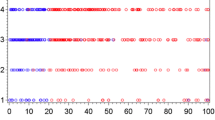Abstract
The increase in referrals to cancer genetics clinics, partially associated with the “Angelina Jolie effect”, presents a challenge to existing services, many are already running at full capacity. More efficient ways to deliver genetic counselling are therefore urgently needed. We now systematically offer group instead of standard individual counselling to patients with suspected Hereditary Breast and Ovarian Cancer. Group sessions last 30 min. The first twenty consist of a presentation by the genetic counsellor, the next ten of a discussion involving a cancer geneticist and a psychologist. A short individual consultation ensues, where personal and family issues are addressed and consent obtained. Blood is drawn afterwards. Satisfaction and knowledge are evaluated. We report data for the Oct-2014–Aug-2015 period. 210 patients attended group counselling, up to eight simultaneously. We always fitted them within a 4-h time frame. Mean satisfaction score was 41/43. Knowledge scores increased from 3.1/6 to 4.9/6 post-counselling (p value < 2.2 × 10−16). Thanks to group counselling, we have withstood increases in referrals without compromising care. The “Angelina Jolie effect” and rapid developments in personalized medicine threaten to overwhelm cancer genetics clinics. In this context, our innovative approach should ensure that all patients have access to approved services.
Similar content being viewed by others
References
Evans DG, Barwell J, Eccles DM et al (2014) The Angelina Jolie effect: how high celebrity profile can have a major impact on provision of cancer related services. Breast Cancer Res 16:442–447
Eggermont AM, Caldas C, Ringborg U, Medema R, Tabernero J, Wiestler O (2014) Cancer Core Europe: a consortium to address the cancer care-cancer research continuum challenge. Eur J Cancer 50:2745–2746
Deeks ED (2015) Olaparib: first global approval. Drugs 75:231–240
Zellerino B, Milligan SA, Brooks R, Freedenberg DL, Collingridge DS, Williams MS (2009) Development, testing, and validation of a patient satisfaction questionnaire for use in the clinical genetics setting. Am J Med Genet C Semin Med Genet 151C:191–199
Calzone KA, Prindiville SA, Jourkiv O et al (2005) Randomized comparison of group versus individual genetic education and counseling for familial breast and/or ovarian cancer. J Clin Oncol 23:3455–3464
Rothwell E, Kohlmann W, Jasperson K, Gammon A, Wong B, Kinney A (2012) Patient outcomes associated with group and individual genetic counseling formats. Fam Cancer 11:97–106
Otten E, Birnie E, Ranchor AV, van Tintelen JP, van Langen IM (2015) A group approach to genetic counselling of cardiomyopathy patients: satisfaction and psychological outcomes sufficient for further implementation. Eur J Hum Genet 23:1462–1467
Sukenik-Halevy R, Ludman MD, Ben-Shachar S, Raas-Rothschild A (2016) The time-consuming demands of the practice of medical genetics in the era of advanced genomic testing. Genet Med 18:372–377
Oza AM, Cibula D, Benzaquen AO et al (2015) Olaparib combined with chemotherapy for recurrent platinum-sensitive ovarian cancer: a randomised phase 2 trial. Lancet Oncol 16:87–97
Meric-Bernstam F, Brusco L, Shaw K et al (2015) Feasibility of large-scale genomic testing to facilitate enrollment onto genomically matched clinical trials. J Clin Oncol 33:2753–2762
Robson ME, Storm CD, Weitzel J, Wollins DS, Offit K, American Society of Clinical Oncology (2010) American Society of Clinical Oncology policy statement update: genetic and genomic testing for cancer susceptibility. J Clin Oncol 28:893–901
Robson ME, Bradbury AR, Arun B et al (2015) American Society of Clinical oncology policy statement update: genetic and genomic testing for cancer susceptibility. J Clin Oncol 33:3660–3667
Acknowledgments
This work was selected for an oral presentation at the European Society of Human Genetics annual meeting held in Glasgow, UK, 6–9 June 2015. We are grateful to Frederique Legale and Caroline Baynes for logistical assistance. The Cancer Genetics Clinic at the Gustave Roussy Cancer Campus Grand Paris is supported by the French Institut National du Cancer (INCA).
Author information
Authors and Affiliations
Corresponding author
Ethics declarations
Conflict of interest
Olivier Caron was an invited speaker for Astra Zeneca. The other authors have no conflicts of interest to disclose.
Rights and permissions
About this article
Cite this article
Benusiglio, P.R., Di Maria, M., Dorling, L. et al. Hereditary breast and ovarian cancer: successful systematic implementation of a group approach to genetic counselling. Familial Cancer 16, 51–56 (2017). https://doi.org/10.1007/s10689-016-9929-x
Published:
Issue Date:
DOI: https://doi.org/10.1007/s10689-016-9929-x




